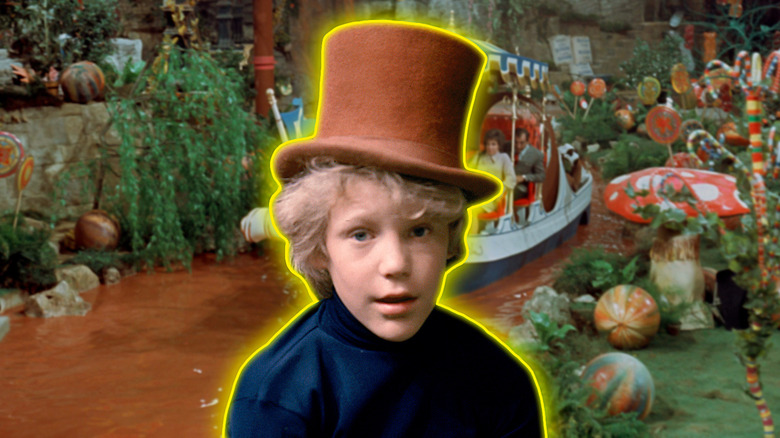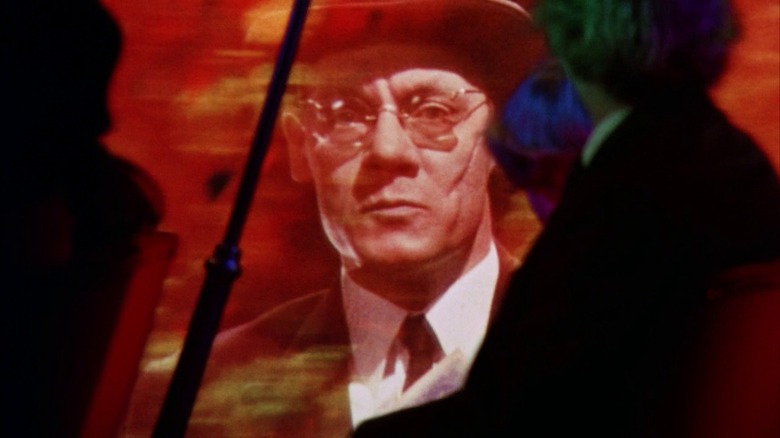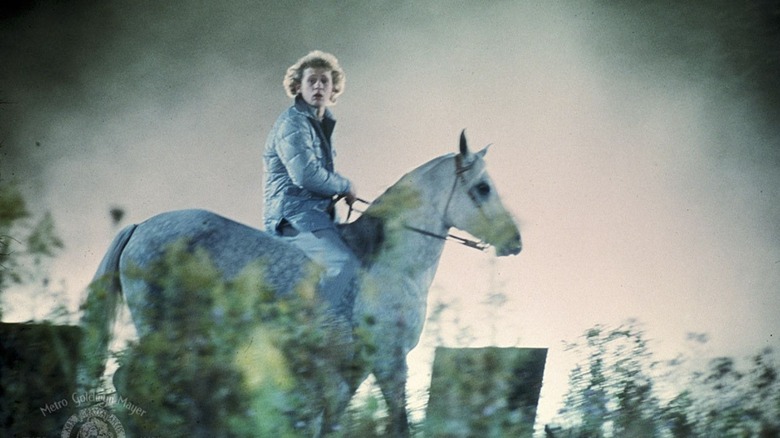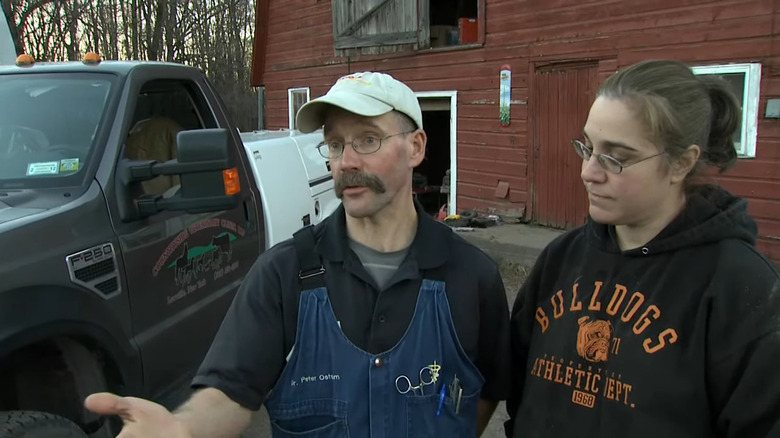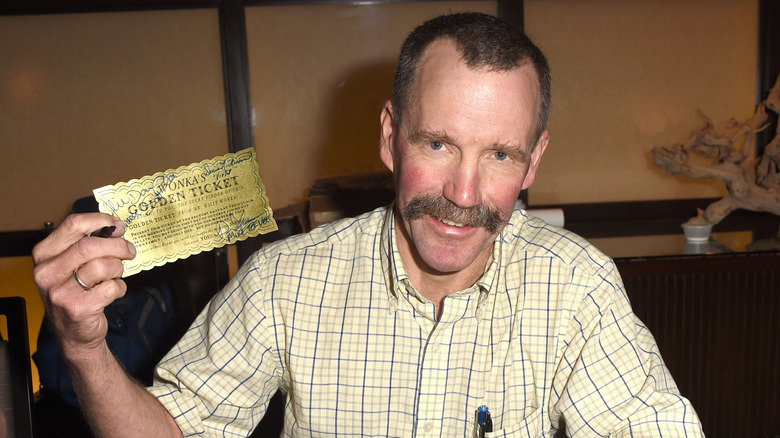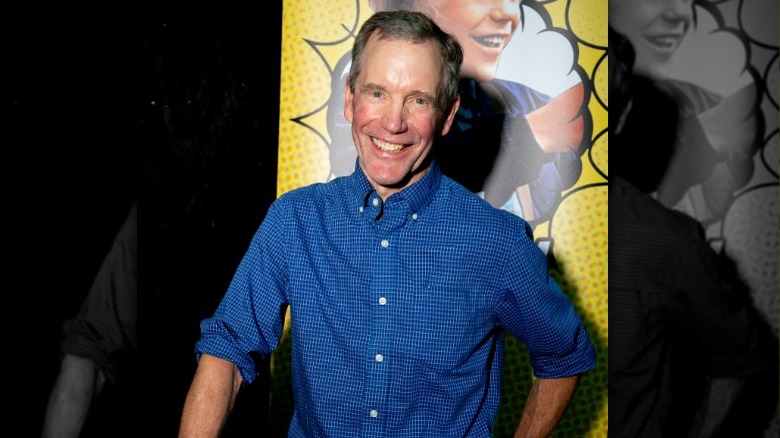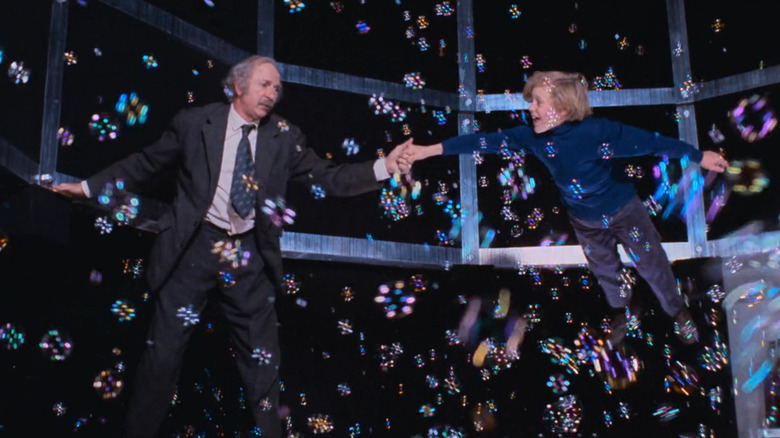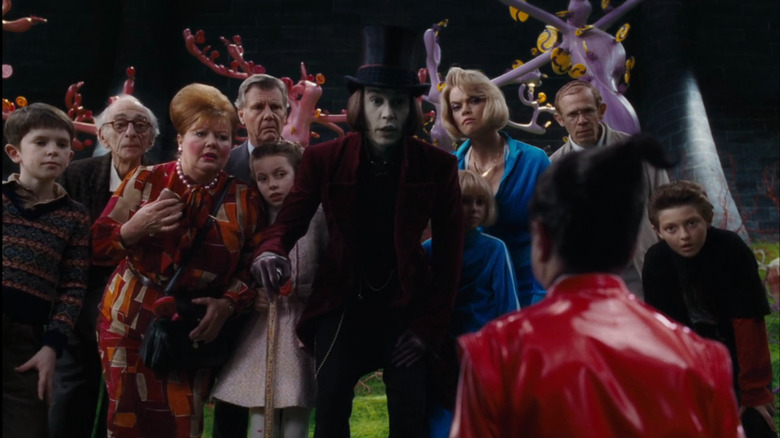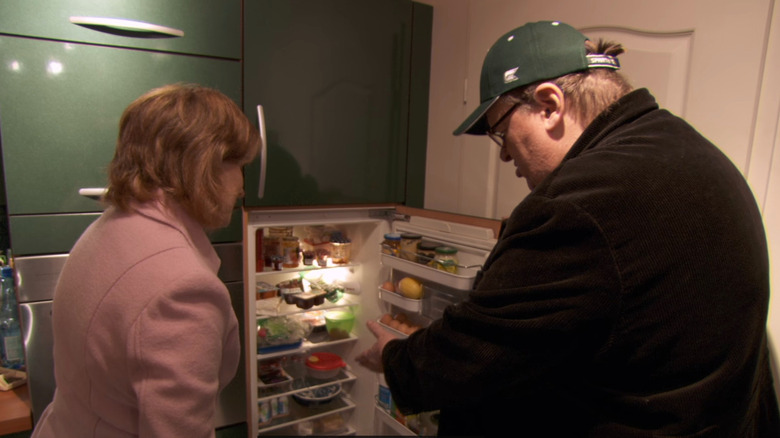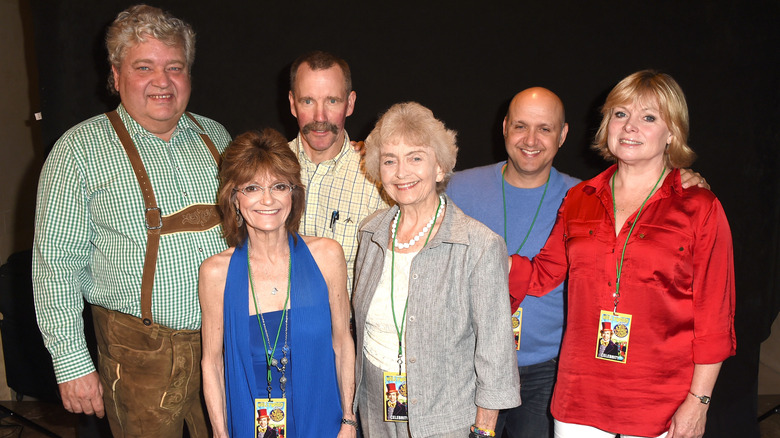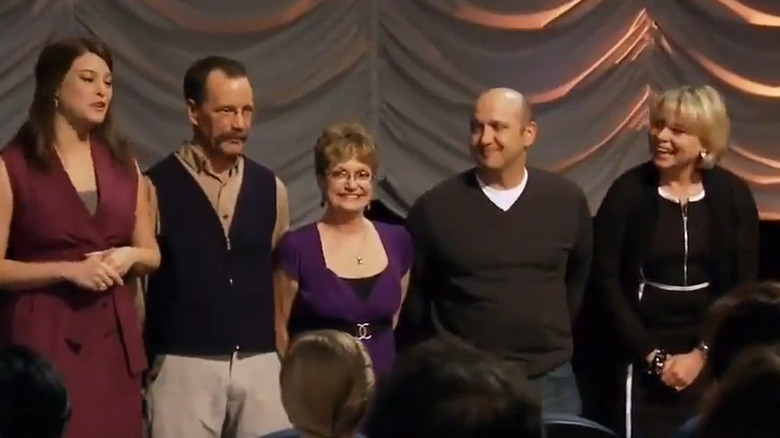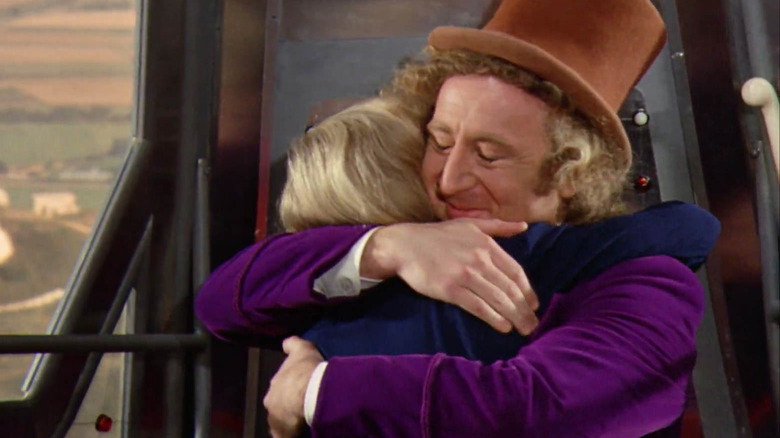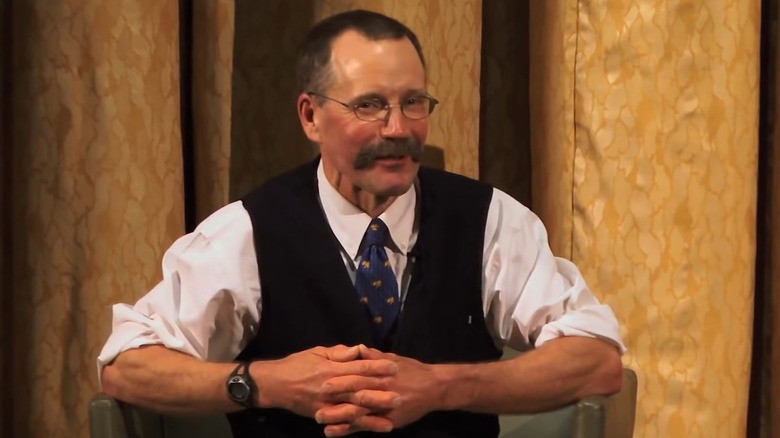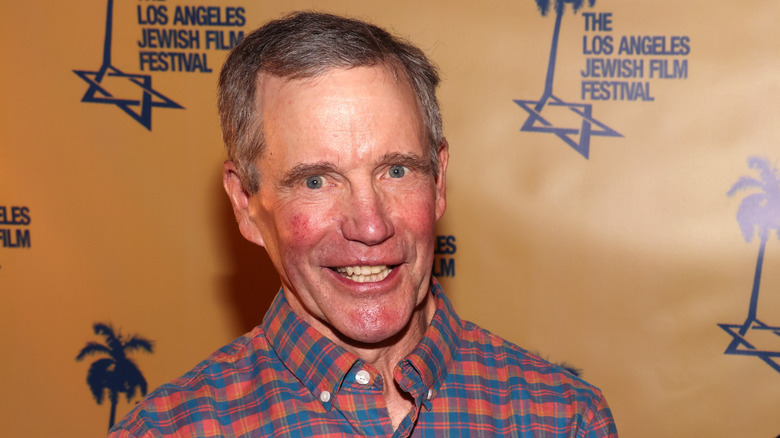Whatever Happened To Charlie From Willy Wonka And The Chocolate Factory?
"But Charlie," warns Gene Wilder's Willy Wonka, in the last moments of the film that bears his name, "don't forget what happened to the man who suddenly got everything he always wanted." "What happened?" a young Charlie Bucket asks. Wonka replies, almost blankly, and without an immediate smile: "He lived happily ever after."
Peter Ostrum was just 12 years old when he was cast as Charlie in "Willy Wonka and the Chocolate Factory," the 1971 classic starring Wilder (fresh from one of his best films), directed by Mel Stuart, and produced by prolific TV and film producer David L.Wolper. Overnight, the boy from Cleveland, Ohio had gone from being a middle-schooler to a movie star, working with some of the biggest names in Hollywood.
Indeed, Ostrum had in a real sense seemingly won his own golden ticket, and was even offered a prize as life-changing as the keys to Wonka's chocolate kingdom at the end of the experience. What he did with that prize, however, could not have been more different from his fictional counterpart.
Peter Ostrum declined a three-picture deal with Wolper Studios
Peter Ostrum had apparently impressed producer David L. Wolper enough in "Willy Wonka" that the latter offered him a three-picture deal with his Wolper Studios. Though it may not have been the most lucrative deal for the 12-year-old fresh off his professional acting debut, it undoubtedly made him the envy of every child actor and stage parent desperate to get their foot inside the gates of Hollywood. Yet he declined the offer. Speaking to Oprah Winfrey's crew in a "Where Are They Now?" segment, Ostrum said of the film industry, "It just wasn't for me." But that doesn't mean the once-in-a-lifetime experience had been wasted on him.
While filming "Willy Wonka and the Chocolate Factory," Ostrum had begun to take an interest in medicine, and when he returned home he used what money he had earned from his brief career in acting to purchase a horse. This animal would begin to nurture a passion building within Ostrum, that would only be further supported as fortune favored his new ambitions — and left old ones abandoned.
He tried auditioning before retiring for good
In 1974, when Wonka's would-be heir was in his latter teen years, the play "Equus" opened on Broadway at the Plymouth Theater. English actor Peter Firth starred as Alan Strang, a 17-year-old boy suffering from a complex psychological ailment that ultimately manifested itself in his peculiar obsession with horses. While "Willy Wonka and the Chocolate Factory" was still a relatively obscure children's film, "Equus" had become a critical sensation — with specific praise heaped upon Firth, just a few years Peter Ostrum's senior.
When he left the production and its casting directors began searching for a replacement, Ostrum had the urge to throw his hat into the ring. It was a moment in his life that he once described to Hollywood Chicago (via The Sun) as "the only time [he] ever considered" a return to acting, admitting, "Getting the part would have been like lightning striking twice." Ultimately, the job went to Firth's understudy, a young Tom Hulce. Now fully retired from acting and auditioning, he turned his focus completely toward something very appropriate: horses.
He worked with Olympic horses
After purchasing a horse of his own with his wages, Peter Ostrum had quickly taken a liking to equine care. He was in awe of a veterinarian at a boarding stable in Lyndhurst, Ohio (where Ostrum worked briefly in the years after leaving Wonka's factory), whom he believed at the time had "the greatest job in the world." Ostrum began focusing on a career in veterinary medicine with an almost single-minded ambition. "Once I realized veterinary medicine was something I wanted to pursue, I knew I had to buckle down and do well in my math and science courses," he told Veterinary Practice News in 2023.
In 1975, when Ostrum was 18, he started working at Friendship Farm in East Moline, Illinois, just before they sponsored the Japanese 3-Day Equestrian Team at the 1976 Summer Olympic Games. He accompanied the team to Montreal, Canada, where his first-hand experience working with highly trained veterinarians showed him the full scope of what his career in veterinary medicine could be. But, once again, Ostrum allowed life to shift his ambitions — if ever so slightly.
He became a doctor of veterinary medicine
Peter Ostrum's Olympic experience may have impressed upon him the personal importance of reaching his fullest potential as an equine veterinarian, but he soon found another veterinary discipline that captured his interest even more. "I thought I would become an equine practitioner in school," he told Veterinary Practice News, "so to round out my resume, I worked on a beef cattle ranch for six months."
This brief venture, originally a mere attempt at beefing up his resume, helped Ostrum find his love for working with cattle. After graduating from Ohio State University and beginning his post-graduate studies at the Cornell University School of Veterinary Medicine, he took another opportunity to work with cattle at a dairy ranch in Vermont. In 1985, he graduated from Cornell University with a Doctorate in Veterinary Medicine. In the months following his graduation, Ostrum sought out a dairy practice to make his professional home. Eventually, he found the Countryside Veterinary Clinic in Lowville, New York.
He got married — and revealed his past career
Loretta Lepkowski grew up in Tug Hill, a region of New York State (between Lake Ontario and the Adirondacks), as one of nine children raised on a small dairy farm. When Peter Ostrum first fell for Lepkowski, any lies or half-truths he might have told her were likely no more extraordinary than those of anyone hoping to impress a new flame — save the little matter of his time as a child star.
For whatever reason, Ostrum had taken to lying about his involvement in "Willy Wonka and the Chocolate Factory," even as it enjoyed a growing cult status in the decades after its debut. When asked about it point-blank by someone who recognized him as young Charlie Bucket, Ostrum would claim it was actually his brother who played the role. It wasn't until Lepkowski was to meet Ostrum's mother that he finally came clean about being in the film almost 15 years prior. Fortunately, this reveal didn't derail the couple's love story — in 1987, the two were married. Soon after, they welcomed two children to their life in Lowville.
He began sharing his own story with schoolchildren
"I didn't really want to have anything to do with ['Willy Wonka...']," Peter Ostrum told the Oprah Winfrey Network in 2014. "I really didn't appreciate the significance of the film until I had children of my own." Seeing them interested in the story showed Ostrum that his experience was "a little bit unique." Seemingly as a consequence, he began to embrace this chapter of his life in the hopes that it might inspire children like his own to dream of their own worlds of pure imagination.
Starting in 1990 (the same year that "Charlie and the Chocolate Factory" author Roald Dahl passed away), Ostrum began making yearly visits to Lowville Academy, where he shared his story with schoolchildren and answered any and all questions about the film. He became something of a local legend, with the town's video store having to replace its copy of "Willy Wonka..." after renters wore out the VHS tape twice. Ostrum told the Seattle Times in 2005, "It's nice in a rural town like this ... to tell [children] there's a bigger world out there."
He recorded a commentary track for Willy Wonka and the Chocolate Factory
In October 2000, Peter Ostrum joined with Julie Dawn Cole (who played Veruca Salt), Denise Nickerson (Violet Beauregarde), Paris Themmen (Mike Teevee), and Michael Bollner (Augustus Gloop) to record a commentary track for the "Willy Wonka" DVD. "We've never really sat down, all the '[Wonka] kids,' and watched the film together," he shared with the Journal of the American Veterinary Medical Association the next month. "When you watch the DVD you'll be able to hear our reactions and commentary throughout the film. That will be unique."
Together, they laughed about how Cole and Nickerson had competing (and at times cooperative) childhood crushes on Ostrum, and how Ostrum and actor Jack Albertson (who played Grandpa Joe and passed away in 1981) were dangled rather painfully during the "Fizzy Lifting Drinks" sequence. "We wore these leather 'girdles,' is the only way I can describe them, and all your weight is hanging right on your crotch. Jack made reference that the music that should be played to this should be from 'The Nutcracker Suite.'"
Tim Burton's Charlie and the Chocolate Factory made him famous once more
With sales of the original film doing exceedingly well, Warner Bros. began the process of courting the Roald Dahl Estate to purchase the rights to produce another film. The negotiations were successful, though Dahl's family was given complete creative control in order to protect the integrity of the source material (which Dahl felt had been lacking in Mel Stuart's "Willy Wonka and the Chocolate Factory," as it differs greatly from the book).
After many years in development hell, Tim Burton's "Charlie and the Chocolate Factory" finally hit theaters during the summer blockbuster season of 2005. And though it was now Freddie Highmore and Johnny Depp who found themselves within the castle of the world's most famous fictional chocolatier, attention turned back to Dr. Peter Ostrum. "...[A] new take on Dahl's novel ... opened yesterday," wrote Cara Anna of the Seattle Times, "and everyone wants to know how Ostrum feels."
Despite being tracked down to Lowville by a number of reporters, Ostrum gave almost no interviews about the 2005 reboot. NPR, however, was able to ask him about his thoughts on Burton's take — he replied, using an analogy apparently borrowed from Veruca Salt actor Julie Dawn Cole: "It's sort of like going back to a house that you once lived in that's been redecorated."
His singing was heard in a Michael Moore documentary
Whether or not Peter Ostrum and Gene Wilder enjoyed "Charlie and the Chocolate Factory," the film was a hit. Perhaps this story's re-entrance into the wider moviegoing consciousness is why director Michael Moore licensed music from the first film to use in his 2007 documentary "Sicko."
The film has absolutely nothing to do with either adaptation of Roald Dahl's novel. However, in one scene Moore opted to use a recording from "Willy Wonka" of Peter Ostrum singing "(I've Got a) Golden Ticket" alongside Jack Albertson. Its inclusion is notable, as Ostrum was once told — or, rather, assured — that his singing voice wouldn't appear in the final cut of the film.
"When I auditioned for the film," he began to NPR, "I had to sing and they said, 'Don't worry ... We'll probably cut your voice out and we'll use somebody else's voice.'" Ostrum, who didn't think his singing was up to par, was glad to hear it. Nevertheless, they ultimately used his voice, preserving it for near-eternity within one of the most recognizable songs ever in a movie musical.
He partnered with Dunkin' Donuts for a promotional campaign in Boston
Possibly the strangest chapter in Peter Ostrum's eclectic post-"Willy Wonka" career was his collaboration with fast-food coffee chain Dunkin' Donuts for an ad campaign called "You Kin' Do It!" He traveled to Boston, Massachusetts, where he spent a day at the South Station public transit hub handing out free prepaid fare cards colloquially referred to as "Charlie Cards" — hence, his (albeit tenuous) connection to the endeavor.
As part of the promotion, Dunkin' Donuts partnered with the Massachusetts Bay Transportation Association to give one lucky rider a "golden ticket" of their own, which entitled them to a free year of rides on the T-line train as well as a free year of Dunkin' Donuts coffee. Ostrum personally handed the oversized ticket to a seemingly less-than-amused patron early in the morning, but appeared to be enjoying interacting with fans who both appreciated the free rides and marveled at meeting the star of such a beloved film.
He celebrated the 40th anniversary of Willy Wonka
In the blink of an eye, 40 years had passed between Peter Ostrum's brush with stardom and his current life as a large animal veterinarian in Lowville, New York. His children had aged out of Wonka-wonderment, and were preparing for college. Ostrum, meanwhile, now 54 and fully immersed in the legacy of "Willy Wonka and the Chocolate Factory," prepared to gather with his castmates once more for a rare public reunion to celebrate the 40th anniversary milestone.
Denise Nickerson (who played Violet Beauregard in the original film) told the Times of Northwest Indiana how momentous it was to get Ostrum involved in something so public, especially at this stage in his life. "Peter has never really done interviews or had an interest in making appearances," she said. "But for this special anniversary, he's agreed to join the rest of us. Plus, his own son is heading off to college and with college tuition prices, every bit helps."
He was featured on a few reality television series
In 2011, Peter Ostrum joined the full cast of Wonka-kids (save Augustus Gloop actor Michael Bollner) for "Top Chef: Just Desserts" Season 2, Episode 4, "Pure Imagination," in which the season's bakers were challenged to create dishes inspired by "Willy Wonka and the Chocolate Factory." The appearance served as a tie-in advertisement for the release of the 40th anniversary special edition of the movie. Later that same year, he attended a special 40th anniversary screening of "Willy Wonka" on his own as a special guest at the George Eastman House museum in Rochester, New York. Fan fervor was apparently so pronounced that day that the presenter joked she "had an easier time keeping people away from Meryl Streep."
When Pfizer began funding a reality program focusing on veterinarians called "Veterinarians on Call," Ostrum picked up the phone. Production sent a crew out to his home in Lowville, New York, where they spent a week following him as he worked with various dairy and cattle farms in the area. Though the program did briefly touch upon his role in "Willy Wonka," the majority of it was dedicated to showcasing his skill and care as a veterinarian.
He mourned the death of Gene Wilder
On September 1, 2016, Gene Wilder passed away at the age of 83, due to complications from Alzheimer's disease. For this somber occasion, Peter Ostrum once again began to make rare public appearances and statements. "[Losing Wilder is] kind of like losing a parent," said Ostrum at the time in an interview with Variety. "You know it's going to happen, but it's still a shock." Just as he had struggled with his connection to the film, Ostrum said, "My gut feeling is that Willy Wonka wasn't his favorite [role]. But that's the role now that people across the generations remember him for."
For better and for worse, it seems Ostrum's statement holds some truth — even for the doctor himself, as he remembered a small yet tender tradition he shared with Wilder while shooting that wouldn't at all be out of place for the fictional characters that followed them for decades afterward. He recalled fondly, "[Production] would break for lunch and Gene and I would always buy a chocolate bar and share it on the way back to the set." He concluded of Wilder's genuine character, "He was a gentle man, but he was also a gentleman. He treated people with respect and dignity."
He was a guest at the 2018 Snowtown Film Festival
For whatever reason — be it the death of Gene Wilder, the cost of college tuition, a newfound comfort in public spaces, or some other cause entirely — it seems as though Peter Ostrum has taken a much more relaxed approach to addressing the film to the wider public in recent years. He's even continued to appear at select screenings of "Willy Wonka and the Chocolate Factory" on his own, including one that was part of the 2018 Snowtown Film Festival in Watertown, New York — about 30 minutes from his home in Lowville.
47 years after its initial release, interest in the original Mel Stuart film continued to persist, and the patrons of Snowtown were eager for the chance to screen the film alongside one of its most beloved stars. The audience in attendance that day reportedly erupted with cheers and applause as Ostrum's name appeared in the opening credits. Following the screening, Ostrum answered questions from and offered advice to the audience members, many of whom were children around the same age he was when he was cast as Charlie Bucket.
He officially retired in 2022
In 2022, at the age of 65, Dr. Peter Ostrum retired from the Countryside Veterinary Clinic after 37 years. His presence is still preserved on the company's website as of this writing, where a short biography states that serving the local farming community had been "a great source of satisfaction for him" over the years. Ostrum still works with Dairy Health and Management Services, a global consulting firm he founded and manages with three other partners. He described the company's role to Veterinary Practice News as "[working] with large, progressive dairies with a real emphasis on research and data-driven decisions based on the data that we collect."
In 2014, Ostrum was ranked among VH1's 100 greatest child stars of all time, coming in at #78 (just above Diane Keaton). As of 2018, he still receives royalty checks for "Willy Wonka and the Chocolate Factory" ranging from $8 to $10, depending on the month and how much it's played on television. His favorite quote from the film: "So shines a good deed in a weary world," uttered with reverence by Gene Wilder after Charlie Bucket proves himself worthy of the Wonka legacy.
